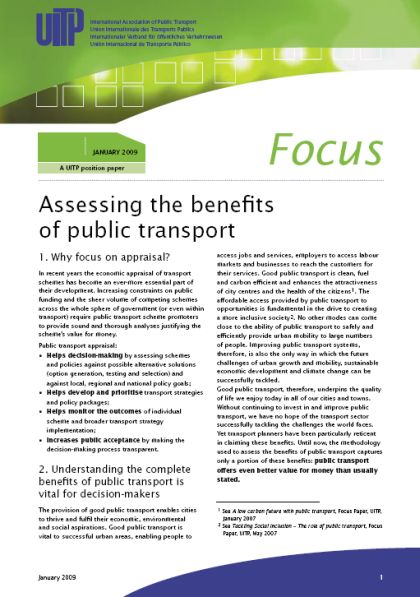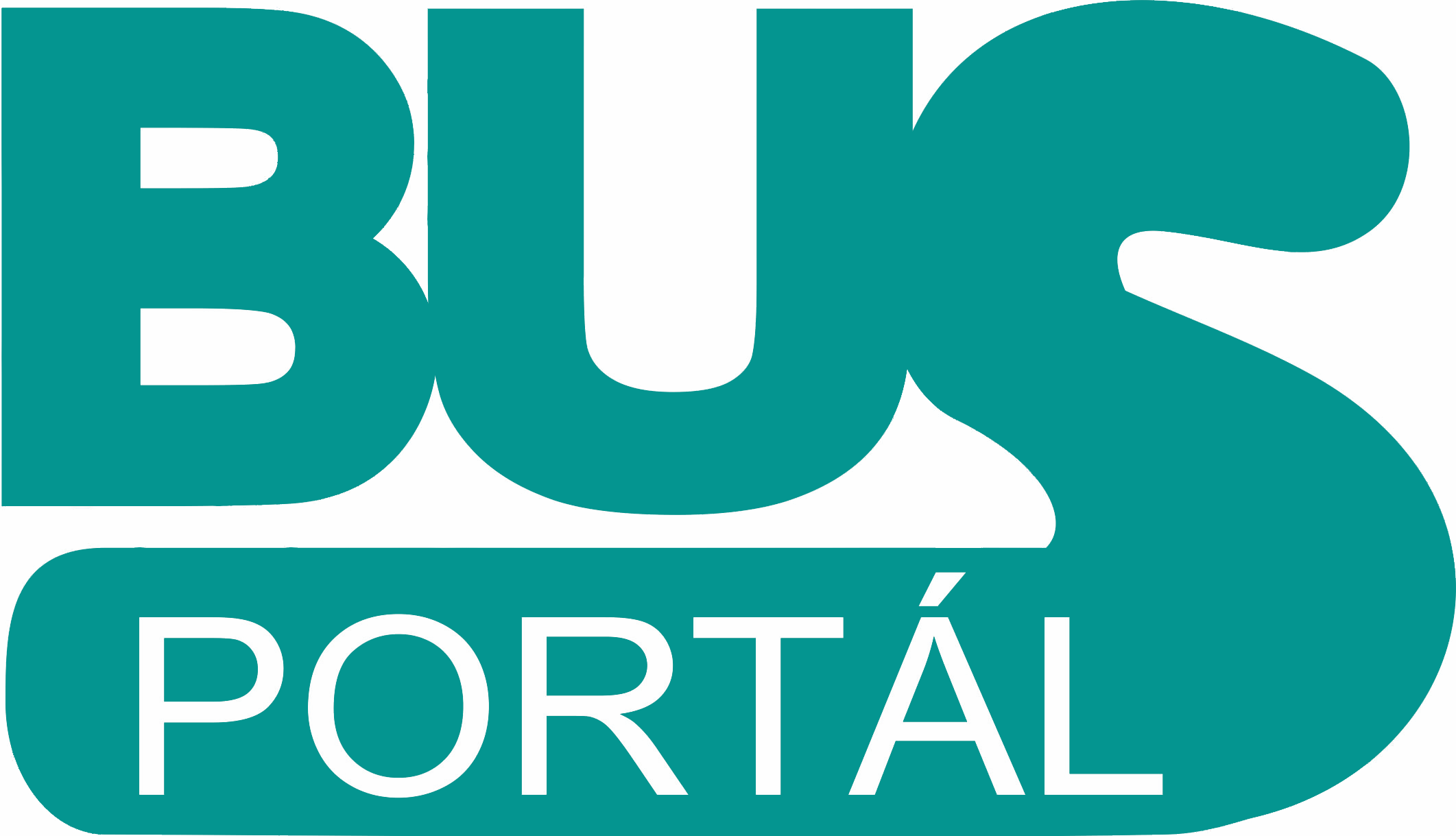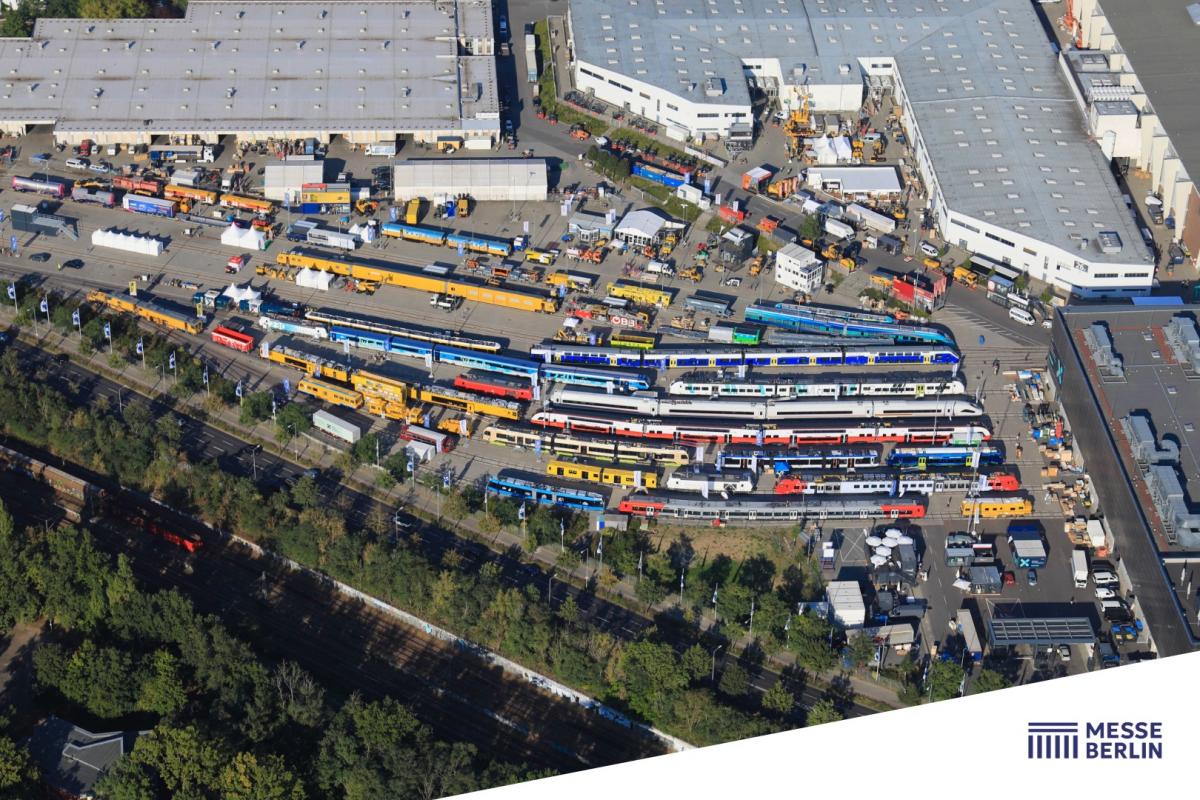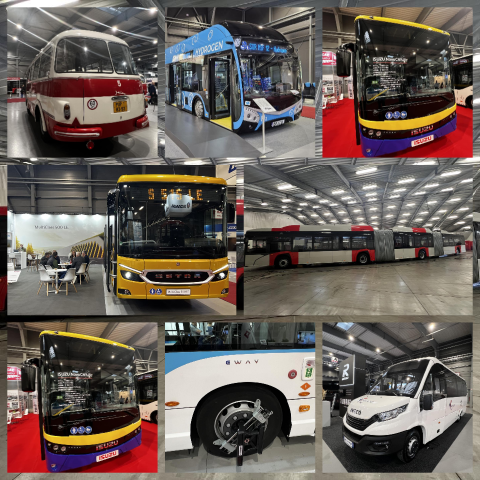
(CZ + EN) (Public transport offers better value for money than usually stated.)
(CZ + EN) (Public transport offers better value for money than usually stated.)
Závěry posledních novin UITP Focus k vyhodnocení výhod veřejné dopravy uvádějí, že běžné techniky odhadu nezaručují správnost všech benefitů schémat veřejné dopravy poskytovaných široké ekonomice.
Systematická analýza benefitů umožňuje těm, kteří rozhodují, vyvíjet a upřednostňovat dopravní strategie.
Focus volá po rozšíření tradičních hodnotících kritérií a identifikuje sedm hlavních oblastí, kde nejsou běžně výhody veřejné dopravy uvažovány a oceňovány.
Tématice se bude věnovat i UITP World Congress 2009 v červnu ve Vídni
A systematic cost benefits analysis enables decision-makers to asses transport schemes and policies, to develop and prioritise transport strategies and monitor their outcomes.
The UITP Focus Paper calls for an extension of traditional appraisal criteria and identifies seven main areas where public transport benefits are not currently considered and measured:
The quantification of these benefits requests the development of new practical methodologies and UITP calls on researchers to develop them. However, some projects have already benefited of new appraisal methodologies. These pioneering examples are included into this Focus Paper illustrating all the interest of such new methodologies.
The Focus Paper finally calls decision-makers to include these appraisal methodologies into their evaluation process and to “recognise the wider economic, environmental and social contribution made by public transport to the success of their cities, and provide the resources needed to ensure public transport can continue to play this critical role”.
See the complete Focus Paper: ‘Assessing the benefits of public transport’
A session will be dedicated to this theme during the UITP World Congress that will take place in Vienna in June 2009. The complete programme.
Financing public transport: a political and economical challenge.
Systematická analýza benefitů umožňuje těm, kteří rozhodují, vyvíjet a upřednostňovat dopravní strategie.
Focus volá po rozšíření tradičních hodnotících kritérií a identifikuje sedm hlavních oblastí, kde nejsou běžně výhody veřejné dopravy uvažovány a oceňovány.
- Ekonomická produktivita
- Kvalita městských oblastí
- Regenerace, sociální začlenění a ekonomická vitalita
- Spolehlivost dopravního systému
- Růst populace
- Zdravotní benefity
- Bezpečnost
Tématice se bude věnovat i UITP World Congress 2009 v červnu ve Vídni
Z TZ UITP Vienna. Kompletní s odkazy v angličtině.
Public transport offers better value for money than usually stated
These are the findings of a recent Focus Paper of UITP on the assessment of the benefits of public transport. Current appraisal techniques do not do justice to the full benefits public transport schemes provide to the wider economy.A systematic cost benefits analysis enables decision-makers to asses transport schemes and policies, to develop and prioritise transport strategies and monitor their outcomes.
The UITP Focus Paper calls for an extension of traditional appraisal criteria and identifies seven main areas where public transport benefits are not currently considered and measured:
- Economic productivity: public transport schemes enable wider economic benefits to be exploited by increasing the pool of potential employees and customers for businesses and enabling greater concentration of businesses. These benefits are known as agglomeration benefits. This contributes billions of Euros to national GDPs over the lifetime of major schemes.
- Quality of urban realm: the efficiency of public transport enables people to access city centres, whilst also allowing valuable public space to be used for walking, cycling, relaxing and enjoying our cities.
- Regeneration, social inclusion and economic vitality: transport schemes have indirect benefits on deprived areas by providing access to large centres of employment, healthcare and other essential services such as education.
- Reliability of the transport system: Public transport provides levels of reliability which enable business and commuters to make the best use of their time with a direct and positive effect on overall productivity.
- Population growth: urban populations are growing, and the demand for housing is increasing as household size diminishes. The integration of housing and transport planning enables cities to grow in size sustainably. In particular, where accessibility to an area is poor or non-existent, there can be a strong case for making sure that good public transport connections are in place before a new housing development is completed.
- Health benefits: there is increasing recognition of the interrelationship between transport, the environment and physical activity.
- Security: public transport contributes to enhancing personal security and to reduce both crime rates and the perception of insecurity. Improved personal security is very valued by citizens.
The quantification of these benefits requests the development of new practical methodologies and UITP calls on researchers to develop them. However, some projects have already benefited of new appraisal methodologies. These pioneering examples are included into this Focus Paper illustrating all the interest of such new methodologies.
The Focus Paper finally calls decision-makers to include these appraisal methodologies into their evaluation process and to “recognise the wider economic, environmental and social contribution made by public transport to the success of their cities, and provide the resources needed to ensure public transport can continue to play this critical role”.
See the complete Focus Paper: ‘Assessing the benefits of public transport’
A session will be dedicated to this theme during the UITP World Congress that will take place in Vienna in June 2009. The complete programme.
Financing public transport: a political and economical challenge.
PR UITP Vienna.


 (002).jpg)



 Solaris se na podzim zúčastní několika veletrhů
Solaris se na podzim zúčastní několika veletrhů
 InnoTrans 2024 byl rekordní
InnoTrans 2024 byl rekordní
 Co nabídne letošní veletrh CZECHBUS
Co nabídne letošní veletrh CZECHBUS





